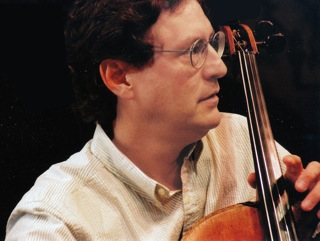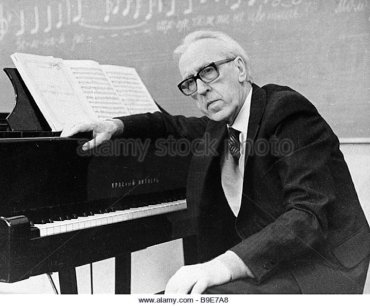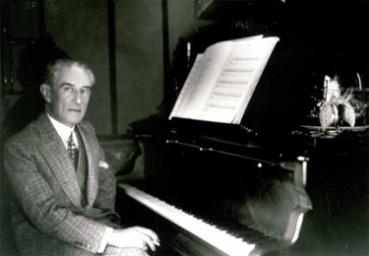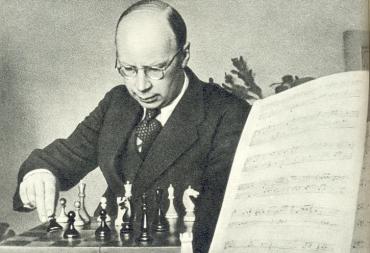The Well-Tempered Ear
Classical music: It’s Valentine’s Day 2018. Let us now praise musical couples and say what music we would play to celebrate romantic love
3 Comments
ALERT: If you are a fan of new music, you might not want to miss a FREE concert this Thursday night at 8 p.m. in Mills Hall by the UW-Madison Contemporary Chamber Ensemble.
The program of “Ideas and Landscapes,” assembled and directed by UW’s award-winning composer Laura Schwendinger, includes works by UW students and alumni as well as a world premiere of a work for solo oboe by Schwendinger herself.
For more details about the composers, the performers and the complete program, go to:
https://www.music.wisc.edu/event/contemporary-chamber-ensemble/
By Jacob Stockinger
It is Valentine’s Day 2018, and music plays a big role in celebrating the holiday — as the portrait of Cupid (below) expresses.
This week, musician and teacher Miles Hoffman was featured by National Public Radio (NPR) on the program “Morning Edition” with a most appropriate story about famous musical couples who were also linked romantically.
The Ear was particularly pleased that a same-sex couple – British composer Benjamin Britten (below left) and British tenor Peter Pears (below right) — was recognized during this time when the homophobic administration of President Donald Trump and Vice-President Mike Pence keeps attacking the rights of lesbian, gay, bisexual and transgender (LGBT) people under the guise of protecting and promoting religious tolerance. The leaders use the concept of religious freedom as camouflage for bigotry, zealotry and prejudice.
But more conventional and traditional couples were also recognized, and deservedly so.
Here is a link to the story that also contains some wonderful musical samples:
And here is what The Ear wants to know:
First: Can you think of other musical couples – especially local ones — to single out for recognition on Valentine’s Day? The Karp family as well as pianists-singers Bill Lutes and Martha Fischer plus singers Cheryl Bensman Rowe and Paul Rowe, conductor Kyle Knox and Madison Symphony Orchestra concertmaster Naha Greenholtz, and violinist Soh-Hyun Park Altino and cellist Leonardo Altino all come immediately to mind. But surely there are others The Ear has overlooked.
Second: What piece of classical music would you listen to or play in order to express love for your Valentine?
Leave the names and information, with a YouTube link if possible, in the COMMENT section.
Happy Valentine’s Day!!
Tags: #ClaraSchumann, #DonaldTrump, #FreedomOfReligion, #GreatBritain, #LauraSchwendinger, #MadisonSymphonyOrchestra, #MeadWitterSchoolofMusic, #MIkePence, #MorningEdition, #NationalPublicRadio, #NewMusic, #PresidentTrump, #ReligiousFreedom, #RobertSchumann, #TheWelltemperedEar, #UnitedKingdom, #UnitedStates, #UniversityofWisconsin-Madison, #ValentinesDay, #VicePresident, alumni, Arts, assume, Benjamin Britten, big, bigotry, Bil Lutes, bisexual, British, Britten, camouflage, celebrate, Cello, Chamber music, Cheryl Bensman Rowe, Christianity, Clara Schumann, Classical music, composer, concertmaster, conductor, contemporary, couple, cupid, direct, freedom, Galina Vishnevskaya, gay, Holiday, idea, information, Jacob Stockinger, Karp, landscape, Laura Schwendinger, lesbian, LGBT, Love, Madison, Madison Symphony Orchestra, Martha Fischer, Miles Hoffman, Mstislav Rostropovich, Music, Music education, Musician, Naha Greenholtz, name, New Music, NPR, Oboe, Paul Rowe, performer, Peter Pears, Piano, portrait, Prejudice, premiere, President, program, promote, protect, Religion, Robert Schumann, role, Romance, Romantic, same-sex, sample, sex, singer, Sonata, song, story, Student, Teacher, tenor, The Ear, The WellTemperedEar, tolerance, transgender, UK, United States, University of Wisconsin-Madison School of Music, University of Wisconsin–Madison, UW Contemporary Chamber Ensemble, Valentine's Day, Viola, Violin, Wisconsin, world, world premiere, YouTube, zealot, zealotry
Classical music: German cellist Alban Gerhardt talks about the rarely played Prokofiev Sinfonia Concertante that he will perform this weekend with the Madison Symphony Orchestra as well as his hectic life on the road and in the recording studio. Part 1 of 2.
1 Comment
UPDATES and ALERTS: The Madison Symphony Orchestra is offering a two-for-the price of one ticket sale to this concert if you mention the promotional code word CELLO either in person or on the phone at the Overture Center box office or use it on-line. The sale started today and ends at midnight Wednesday. Also, on this Thursday at noon, on Wisconsin Public Radio‘s “The Midday” with host Norman Gilliland (88.7 FM in the Madison area), cellist Alban Gerhardt will be the guest.
By Jacob Stockinger
There are many things that appeal to The Ear about this weekend’s concert by the Madison Symphony Orchestra with its music director and conductor John DeMain.
In deep winter, it will be so welcome to feel the scented warm air of Spain as evoked in Ravel’s “Rapsodie Espagnole.”
And then there is the chance to hear a rarely heard Beethoven symphony – the Symphony No. 4 in B-flat major, which was recently named an ideal piece of classical music for exercising and workout. This symphony usually falls in the shadows of its predecessor (No. 3 “Eroica”) and successor (No. 5). But it is great music nonetheless.
Yet perhaps the biggest draw remains something of a curiosity –- Prokofiev’s Sinfonia Concertante (or Cello Symphony), which is not often heard in performance or recordings.
Also appealing is the cello soloist: the German cellist Alban Gerhardt (below), who has played in Madison several times. Born in 1969, he started piano and cello lessons at 8.
Gerhardt is outstanding and is known not only for his exceptional tone and musicianship, but also for his intense and emotional but outgoing playing that connects with audiences.
He is, in short, an unabashed and unapologetic extrovert, as he demonstrated in the email Q&A he recently gave to The Ear and which was written on the road between concert stops in Saarbrucken and Brussels.
The concerts are in Overture Hall on Friday at 7:30 p.m.; Saturday at 8 p.m.; and Sunday at 2:30 p.m.
Tickets are $16.50-$78.50. Call the Overture Center box office at (608) 258-4141.
For more information, visit:
http://www.madisonsymphony.org/gerhardt
For very informative and accessible program notes by MSO trombonist and University of Wisconsin-Whitewater professor J. Michael Allsen, visit:
http://facstaff.uww.edu/allsenj/MSO/NOTES/1213/6.Feb13.html
And here is a link to Gerhart’s own well-organized and illuminating website with his biography, concert dates, repertoire, photos, music in schools and other activities (it is also available in German):
http://www.albangerhardt.com/english/index.html
Here is my email Q&A with cellist Alban Gerhardt in two parts. Today, he discusses his huge repertoire and his hectic life as a professional cellist on the road and in the recording studio as well as his view of the Prokofiev work. Tomorrow, he will discuss how he came to the cello, what he thinks of Madison and his views about the best ways to educate young people about music and to involve new audiences of adults.
What are your current and future plans in terms of concertizing, recordings and other projects?
As always, the repertoire at hands is quite diverse — last month it was the Friedrich Gulda Concerto in Brussels, and now in Brussels, but with an orchestra from Germany, I am playing Tchaikovsky’s “Rococo” Variations.
After my Prokofiev performance in Madison, I was supposed to perform the Elgar Concerto in Minneapolis, but the orchestra is unfortunately locked out by management, so these concerts got cancelled. That is good for me, as it gives me a few extra days at home in Berlin before playing the Dvorak Concerto in Dublin and the Schumann Concerto in Zürich.
After a couple of recitals I will play Britten’s gorgeous Cello Symphony in Madrid, Walton’s Cello Concerto in Spokane, Shostakovich’s Second Cello Concerto in Nurenberg, the sixth Bach solo suite at Sir John Eliot Gardiner‘s Bach Marathon at the Royal Albert Hall (below) in London (quite an honor for me as the only cellist to be asked by the one of the world’s foremost Bach specialists to play the greatest of all Bach) — and this is only until April.
After that I am not counting as I try to live more in the moment. Recording projects there are plenty as my label Hyperion wants me to record quite different things for them. In their series Romantic Cello Concertos, I am going to record two concerti by Henri Vieuxtemps and two pieces for cello and orchestra by Eugene Ysaye at the beginning of April in Antwerp.
In late August I will record all the Hindemith concertos with the DSO Berlin, and later this year another encore disc plus a Russian recital disc with Cecile Licad with Rachmaninov and Prokofiev Sonatas.
But my biggest undertaking will be to convince my unborn son to come into this world when I am in Berlin middle of June with this kind of schedule: June 1, Dvorak in Leipzig; June 2, chamber music (with my violinist wife) in Braunlage; June 4 and 5 rehearsals in Munich; June 8, Brahms Double Concerto in Berlin with the RSB; June 10 and 11, the Chin Concerto in Munich with Kent Nagano and the State Opera Orchestra; June 14, another Dvorak near Leipzig; June 16, a recital in Bad Kissingen; and June 28, a Brahms Double Concerto in Hamm (with my wife).
The due date is June 18, but both of us were two and three weeks early. So probably he’ll come beginning of the month. I am praying for June 3, which is also easy to remember: 6-3-13.
What would you like to say about Prokofiev’s “Sinfonia Concertante”? Why do you think it isn’t it programmed and performed more often? Are there certain things you would like listeners especially to listen for? Are there other works by Prokofiev or other composers you would compare it to? How do you think it fit a into the program with Ravel (“Rapsodie Espagnole”) and Beethoven (Symphony No. 4)?
Prokofiev’s Cello Symphony is one of the 20th century’s great concertos, created by the collaboration of a genius composer with a genius musician, Mstislav Rostropovich (below), who even wrote certain passages himself (the virtuosic moments in the first movement, for example).
It is based on Prokofiev’s first cello concerto, which is so dark and difficult that none of them were convinced it would work. So both of them sat together and by re-writing it, more or less created a totally different piece, much more accessible and impressive, even though much easier to play than the concerto.
I have recorded both pieces for Hyperion and it is interesting to see the thematic similarities, while the atmosphere and the mood are totally different.
Why is it is not performed more often? Not my fault. I play it as often as I am asked to do it — but especially in the cello repertoire, audiences seem to be more hesitant to listen to “not so common” pieces than with the piano or the violin, which is the reason why orchestras don’t dare to schedule a bigger variety of cello concertos. There are so many great concertos for the cello that are hardly ever played — when have you heard (live) the Barber Concerto, for example? And it is such an amazing work!
I heard Rostropovich play the Prokofiev (a YouTube video of him in the opening part of the “Sinfonia Concertante” is at bottom) when I was a child growing up in Berlin, and I was deeply impressed and knew that one day I would need to perform this piece. As hellishly difficult as it might sound, it is s-o-o-o much fun to play.
After a short first movement comes a monster movement, pyrotechnics at first, a drop-dead-gorgeous second theme (perfect love-theme for any movie score!), a thrilling solo cadenza in which the cellist goes completely nuts, finishing off with octave scales, and the last movement follows promptly as a theme with variations, very witty, sometimes funny, sometimes dark, sometimes drunken. (Kurt Masur, when I did it with him in Leipzig, told me to play one of the variations like a drunken sailor, and I still remember this image very vividly.) The end must be the quickest and have the highest notes in the entire cello repertoire. Shortly before the end, though, you will hear a passage by the horns and the strings which sounds just like “Peter and the Wolf” — each time I perform this I can’t help feeling like a child again. It makes me so happy.
Any other piece to compare it to? No, it’s quite unique, but typically Prokofiev (below)! It fits beautifully into this program, all great music, very different colors and expressions, but all pieces that are very colorful and expressive. I love it, and can’t wait to play it!
Tomorrow: Cellist Alban Gerhardt will discuss how he came to the cello and his career as a professional musician; what he thinks of Madison; the best ways to educate young people about music and to involve new audiences of adults.

















